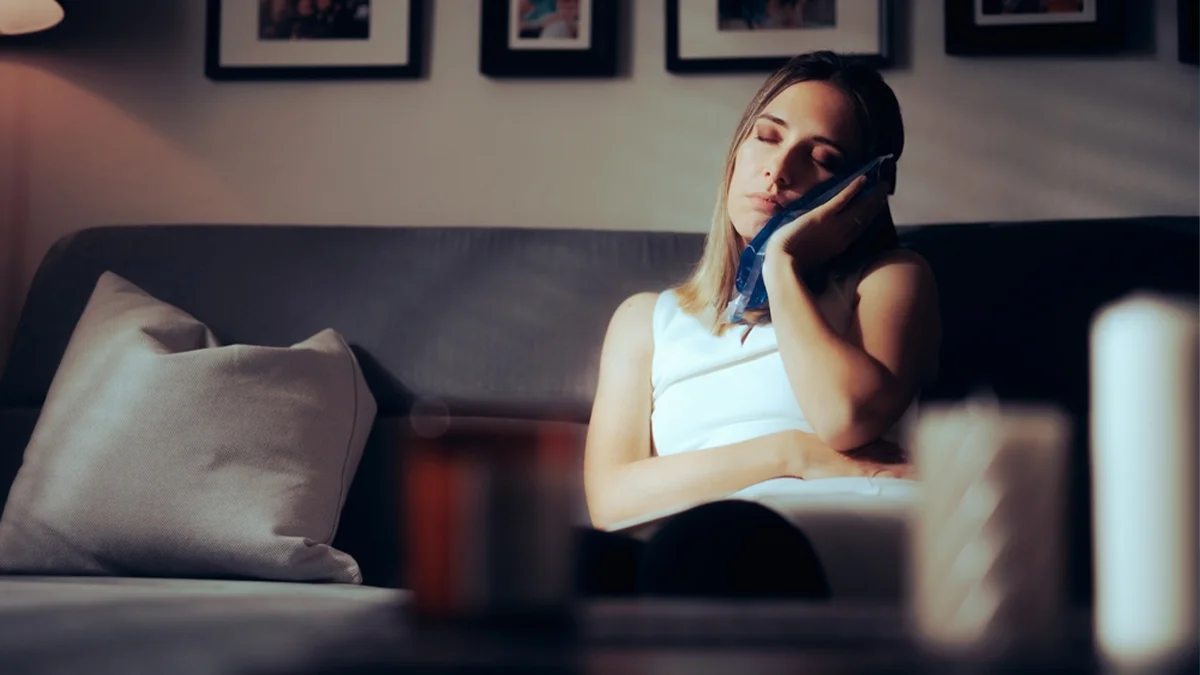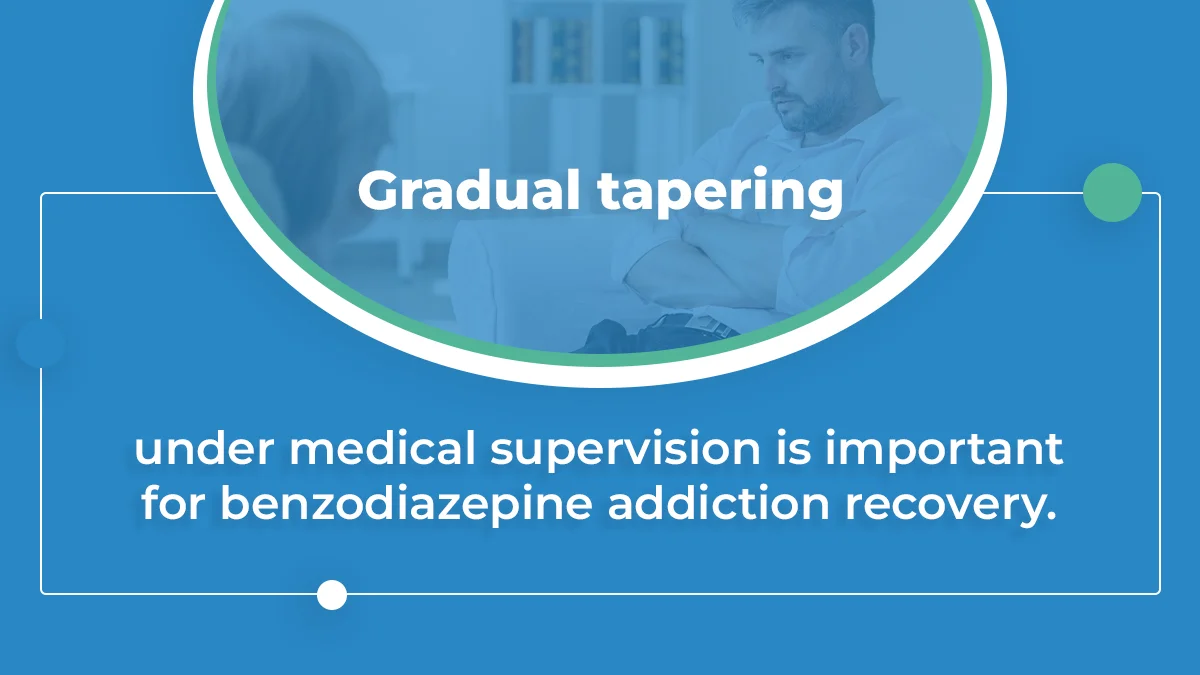Benzodiazepine Liberation: A Roadmap to Recovery
Benzodiazepine addiction is a growing concern, as these prescription medications, commonly used to treat anxiety and insomnia, can lead to dependence and abuse. Recognizing the urgent need for effective interventions, benzodiazepine addiction treatment has emerged as a critical field in mental health.
A comprehensive treatment approach combines medical, psychological, and behavioral strategies to help individuals overcome dependency while addressing underlying mental health issues.
Tailored treatment plans aim to safely taper patients off benzodiazepines, manage withdrawal symptoms, and promote long-term recovery.
Key Takeaways
Tailored treatment plans aim to safely taper patients off benzodiazepines, manage withdrawal symptoms, and promote long-term recovery. Here’s what the article covers:
- Benzodiazepines are prescription medications commonly used to treat anxiety and insomnia.
- Prolonged use of benzodiazepines can result in tolerance and dependence, posing risks for both physical and mental health.
- Gradual tapering under medical supervision is important for benzodiazepine addiction recovery.
- Supportive networks and non-pharmacological interventions enhance long-term success in benzodiazepine addiction recovery.
Contact The Recovery Team at (800) 817-1247 for more information and recovery assistance to embrace long-term healing.
What are Benzos
Benzodiazepines, commonly referred to as “benzos,” are a class of psychoactive drugs that have a central nervous system depressant effect. They are often prescribed for various medical conditions due to their anxiolytic (anxiety-reducing), sedative, hypnotic, muscle relaxant, and anticonvulsant properties. Some common benzodiazepines include diazepam (Valium), lorazepam (Ativan), alprazolam (Xanax), and clonazepam (Klonopin).
What Are They Used For
They are prescribed for various medical conditions due to their ability to produce sedation, induce sleep, relieve anxiety, and relax muscles.
Here are some common medical uses for benzodiazepines:
Anxiety Disorders: Benzodiazepines are often prescribed to manage symptoms of generalized anxiety disorder, panic disorder, and social anxiety disorder.
Insomnia: Some benzodiazepines have sedative-hypnotic properties and are used to treat insomnia by promoting sleep.
Seizure Disorders: Certain benzodiazepines, such as clonazepam, are used to control seizures in conditions like epilepsy.
Muscle Spasms and Spasticity: Benzodiazepines can be prescribed to alleviate muscle spasms and spasticity associated with various medical conditions.
Alcohol Withdrawal: Benzodiazepines are sometimes used to manage symptoms of alcohol withdrawal, such as anxiety and seizures.
Signs and Symptoms of Benzo Addiction
Benzodiazepines are a class of prescription medications used to treat conditions such as anxiety, insomnia, and seizures, but they also have the potential for abuse and addiction.
If someone is struggling with benzodiazepine dependence, they may exhibit the following signs and symptoms:
- Increased Tolerance: Over time, individuals may develop a tolerance to the drug, meaning that higher doses are needed to achieve the same effects.
- Physical Dependence: Dependence occurs when the body becomes accustomed to the presence of the drug, and withdrawal symptoms may occur if the drug is suddenly stopped or the dosage is reduced.
- Withdrawal Symptoms: Withdrawal symptoms can be severe and include anxiety, insomnia, irritability, muscle tension, sweating, nausea, and even seizures in extreme cases.
- Loss of Control: Individuals may find it difficult to control their use of benzodiazepines, taking more than prescribed or using them in ways not intended by the prescribing healthcare professional.
- Preoccupation with Obtaining the Drug: People addicted to benzos may spend a significant amount of time and energy trying to obtain the drug, even if it means engaging in risky or illegal behavior.
- Neglect of Responsibilities: As the addiction progresses, individuals may neglect their responsibilities at work, school, or home, leading to a decline in performance and overall functioning.
- Social Isolation: Benzodiazepine addiction can lead to social withdrawal and isolation as individuals may prioritize drug use over social interactions.
- Continued Use Despite Negative Consequences: Despite experiencing negative consequences such as health problems, relationship issues, or legal troubles, individuals with benzodiazepine addiction may continue to use the drug.
- Changes in Behavior: Behavioral changes may include irritability, mood swings, and a lack of interest in once-enjoyable activities.
- Impaired Cognitive Function: Benzos can cause cognitive impairment, including problems with memory, attention, and concentration.
It’s important to note that not everyone who uses benzos will develop an addiction, and these symptoms may vary in severity. If you or someone you know is experiencing these signs, it’s important to seek professional help and support for addiction treatment.
A healthcare professional can guide a safe and gradual tapering off of the medication, along with counseling and assistance to address the underlying issues contributing to the addiction.
Dangers and Health Impact of Benzo Addiction
Benzos can be effective when used as prescribed, but there are significant dangers and health impacts associated with benzodiazepine addiction.
Here are some key points to consider:
Physical Health Dangers
Respiratory Depression: Benzodiazepines can slow down breathing, especially when taken in large amounts or combined with other substances. This poses a risk of respiratory depression, a condition where breathing becomes dangerously shallow and slow.
Overdose Risk: Taking higher doses than prescribed or combining benzodiazepines with alcohol or other drugs increases the risk of overdose. Overdosing on benzodiazepines can lead to severe respiratory distress, loss of consciousness, and, in extreme cases, death.
Withdrawal Symptoms: Abruptly stopping benzodiazepine use after developing dependence can result in withdrawal symptoms, including seizures, tremors, and nausea. These signs can be severe and require medical attention.
Mental Health Impact
Cognitive Impairment: Prolonged use of benzodiazepines can impair cognitive functions, such as memory and attention. This can impact daily activities and affect academic or work performance.
Increased Anxiety: Paradoxically, long-term use of benzodiazepines can lead to an increase in anxiety symptoms. This creates a cycle where individuals may continue to use the drug to manage anxiety, perpetuating the addiction.
Depression: Benzodiazepine addiction is associated with an increased risk of developing depression. The interaction between the drug and brain chemistry may contribute to mood disorders.
Social and Behavioral Consequences
Relationship Strain: Benzodiazepine addiction can strain relationships with family, friends, and colleagues. Behavioral changes, mood swings, and unreliable behavior can lead to isolation and strained interpersonal connections.
Legal Consequences: Misuse of benzodiazepines, especially without a prescription, can result in legal consequences. Possession of these medicines without a valid prescription is against the law and can lead to criminal charges.
Financial Burden: Funding an addiction can be financially draining. The cost of acquiring benzodiazepines through illicit means or obtaining medical treatment for related health issues can lead to a significant financial burden.
If dependence or addiction is suspected, seeking professional aid is crucial for a safe and effective withdrawal process. Medical supervision and support are often necessary to manage the challenges associated with benzodiazepine addiction.
Addiction Treatment Options
Benzodiazepine addiction poses significant challenges, but fortunately, there are various treatments available to help individuals overcome this struggle and regain control over their lives.
Detoxification
The first step in treating benzo abuse is often detoxification, or detox for short. Detox aims to get rid of the remaining benzodiazepines from the body while helping with withdrawal symptoms. Withdrawal from benzos can be tough and even risky, so it’s important to have a medical team supervise the detox process.
Doctors might slowly reduce the benzo dose to make the withdrawal symptoms less severe, making the whole process easier for the person going through it.
Medication-Assisted Treatment (MAT)
Medication-assisted treatment (MAT) is a verified method for treating benzodiazepine addiction. It includes using certain medications to help people handle cravings and withdrawal symptoms while recovering.
One common medication is flumazenil, which counteracts the effects of benzos. It’s crucial to note that MAT should only be given under the watchful eye of medical professionals because of potential complications and the risk of misuse.
Therapeutic Interventions
Different therapies are important for dealing with the mental side of benzodiazepine addiction. Cognitive-behavioral therapy (CBT) and dialectical behavior therapy (DBT) are helpful. They assist people in recognizing and changing harmful patterns in their thoughts and actions.
These therapies also give individuals tools to handle stress, anxiety, and things that might make their addiction worse.
Support Groups and Counseling
Being part of support groups, like 12-step programs such as Narcotics Anonymous (NA) or SMART Recovery, is a way for people to share their experiences, get support, and stay responsible in their recovery.
Counseling, both one-on-one and in groups, helps individuals understand why they got addicted and create plans for lasting recovery. Peer support from others going through similar struggles can be a strong motivator and a source of inspiration for those working to overcome benzodiazepine addiction.
Holistic Approaches
Holistic approaches emphasize the importance of treating the whole person – mind, body, and spirit. Integrative therapies, such as yoga, meditation, and acupuncture, can complement traditional addiction treatment methods by promoting overall well-being and stress reduction.
These practices help people cultivate a sense of balance and mindfulness, contributing to a healthier and more sustainable recovery.
Long-Term Aftercare
Maintaining recovery from benzodiazepine addiction requires ongoing support and vigilance. Long-term aftercare plans may include continued therapy, regular check-ins with healthcare professionals, and participation in support groups.
Making a relapse prevention plan is important for anticipating and managing potential triggers, thereby reducing the risk of returning to benzodiazepine use.
Recover With The Recovery Team
Take control of your life and defeat Benzo’s addiction with The Recovery Team.
Our comprehensive addiction treatment programs provide personalized support at every step. In residential care, immerse yourself in a supportive environment conducive to healing. Our intensive outpatient programs offer flexibility while ensuring a structured approach to recovery.
In addition, Our Cognitive Behavioral Therapy approach is a game-changer, addressing the root causes of addiction and promoting lasting recovery by aiding you to deal with negative thoughts and patterns fueling substance abuse.
It is time to take the courageous step toward a life of fulfillment and well-being. Contact us at (800) 817-1247 today for more information.






